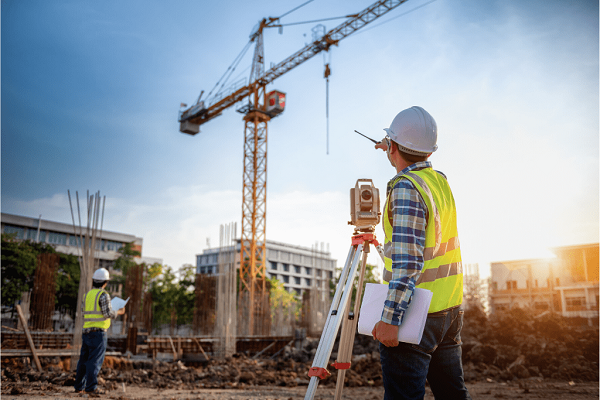Choosing the right surveyor for your construction project is crucial for ensuring accuracy, compliance, and overall success.
Surveyors play a pivotal role in determining boundaries, creating maps, and providing essential data that informs the planning and execution of construction projects.
With various types of surveyors and specializations available, it’s essential to know what to consider before making your selection. This guide outlines key factors to help you choose the right surveyor for your construction project.
1. Understand the Different Types of Surveyors
Surveying is a broad field, and various types of surveyors specialize in different areas. Understanding these distinctions will help you identify which type of surveyor you need:
- Land Surveyors: They measure and map land boundaries and are crucial for property development and construction. They ensure the legal description of the property is accurate and help avoid boundary disputes.
- Construction Surveyors: These surveyors work closely with construction projects to establish precise locations for building structures. They provide layout services, ensuring that everything is built according to design specifications.
- Geodetic Surveyors: They focus on large areas and earth measurements, using sophisticated technology to analyze and interpret data on a global scale. They are often involved in projects that require extensive geographic data.
- Mining Surveyors: Specializing in mining and extraction sites, these surveyors provide crucial information for the planning and execution of mining operations.
- Hydrographic Surveyors: They measure and map underwater features, important for projects involving marine construction or any development near bodies of water.
2. Assess Qualifications and Certifications
When selecting a surveyor, it is essential to assess their qualifications and certifications. In many countries, surveyors must be licensed or registered with a professional body. Check for the following:
- Educational Background: Most professional surveyors have a degree in surveying, civil engineering, or a related field.
- Licensing: Ensure the surveyor holds a valid license for the specific type of surveying work required in your project. This often involves passing exams and completing continuing education.
- Membership in Professional Organizations: Membership in reputable organizations, such as the Royal Institution of Chartered Surveyors (RICS) or the American Society of Civil Engineers (ASCE), indicates a commitment to professionalism and ethical standards.
3. Evaluate Experience and Specialization
Experience is a vital factor in determining the capability of a surveyor. Assess their previous work and specialization:
- Relevant Experience: Look for a surveyor who has experience with projects similar to yours. If your project involves complex topography or specific regulations, a surveyor familiar with those challenges will be beneficial.
- Project Portfolio: Request examples of past projects, including case studies that highlight their methodology, technology used, and the challenges they overcame.
- Client References: Ask for references from previous clients. Speaking to past clients can provide insight into the surveyor’s work ethic, communication skills, and overall reliability.
4. Investigate Technology and Tools
Modern surveying relies heavily on technology for accuracy and efficiency. Assess the tools and technology used by the surveyor:
- GPS and Total Stations: Ensure the surveyor uses high-precision GPS equipment and total stations, which are essential for accurate measurements.
- Drones and 3D Scanning: Consider surveyors who utilize drones for aerial surveys or 3D scanning technologies for detailed site analysis. These tools can save time and improve accuracy.
- Software Proficiency: Familiarity with advanced surveying and mapping software (like AutoCAD, Civil 3D, or GIS tools) is crucial for data analysis and project management.
5. Consider Communication Skills
Effective communication is key to a successful working relationship with your surveyor. Consider the following:
- Clarity: The surveyor should be able to explain complex concepts in a way that is easy to understand. This clarity is essential for collaboration with architects, engineers, and contractors.
- Responsiveness: Evaluate their responsiveness during the initial consultation. A surveyor who is prompt and clear in their communication is likely to maintain that level of professionalism throughout the project.
- Collaboration: Look for a surveyor willing to work closely with your project team, providing regular updates and being open to discussions about project adjustments.
6. Review Cost and Budget
Cost is a critical factor when choosing a surveyor. However, it’s essential to balance cost with quality and experience:
- Obtain Multiple Quotes: Request quotes from several surveyors to compare pricing structures. Ensure you understand what is included in each quote, as some may offer more comprehensive services than others.
- Value for Money: Consider the overall value rather than just the cost. A less expensive surveyor may lack experience or technology, leading to potential issues that could cost more in the long run.
- Payment Structure: Understand their payment structure—whether it’s a flat fee, hourly rate, or based on project milestones. This clarity will help you manage your budget effectively.
7. Trust Your Instincts
Finally, trust your instincts. Choosing a surveyor is not just about qualifications and experience; it’s also about finding someone you feel comfortable working with. Consider the following:
- Personal Rapport: A good working relationship can make a significant difference in the project’s success. Choose someone you feel you can communicate with openly.
- Professionalism: Pay attention to how the surveyor presents themselves during your interactions. Professionalism, reliability, and a proactive attitude are signs of a trustworthy partner.
Conclusion
Choosing the right surveyor for your construction project is a critical decision that can impact the project’s success.
By understanding the different types of surveyors, evaluating their qualifications, experience, technology, communication skills, and budget, you can make an informed choice.
Take the time to assess your options and trust your instincts, ensuring that you select a surveyor who aligns with your project’s needs and values.
A competent surveyor will not only enhance the accuracy of your project but also contribute to its overall efficiency and success.
Also Read
The role of surveying in infrastructure development: A comprehensive guide
Geographic information systems (GIS) in surveying: Enhancing data accuracy

